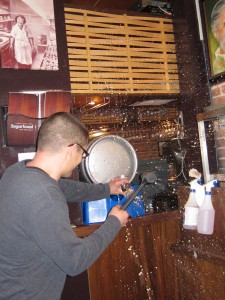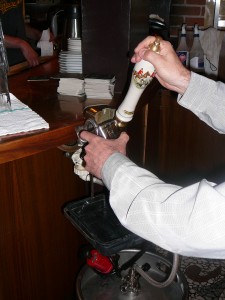A few days ago I attended a cask vs. cask event at Accent Lounge where Alley Kat and Blindman each had a cask tapped at the same time and customers encouraged to vote for which was their favourite. The two intrepid breweries produced VERY different beer. Alley Kat added oak cubes that had been soaked in Old Deuteronomy to a cask of their Tartan Party Scottish Ale, a process that I thought brought out a smoky character in the beer with just a hint of that Old Deut wonderfulness. For their part Blindman dry hopped their Saison Automne with (I think) Galaxy hops (I didn’t take notes and it was a few days ago), producing a beer with a fantastic citrusy aroma followed up by an earthy Belgian spiciness. I don’t know who won (my voting tickets stayed in my pocket because I am a coward).
My point of this post is not to give you a play-by-play of that cask event. Instead, while sipping on the offerings I got into some conversations about where cask ale is at in Alberta these days. So I thought a state of the union article might be in order.
In short, we have come a long way in a short time. I reported on Edmonton’s first cask event back at the Sugar Bowl in 2010 (read my review of the first one here). And, as it works out, my last state of the cask post was two years ago – also after a conversation with beer people about cask events (read here). Looking back at those articles there is no mistaking things have shifted – and mostly for the good.
Allow me to offer some observations about where things are at, followed by some analysis.
- Cask events have simultaneously increased in number and lost some of their excitement. People don’t come “for the cask” anymore, but when it is there, it adds an interesting twist to the evening. You can get a cask a couple times of week now. That said, Sugar Bowl has recently decided to move their cask night from monthly to quarterly (which I predict will soon lead to its elimination). It is important to not read too much into that decision, as the Sugar Bowl is a hopping place on any given day and the cask may not add value for them anymore – but that alone says something.
- Alberta breweries are now expected to produce cask ale as part of their cycle. It is seen as part of the job. If you don’t do casks, at least once in a while, you are seen as not getting in the game. And given the quickly growing number of breweries opening in the province, that means a greater diversity of cask offerings. Related to that, I also sense that breweries are working harder to make their casks interesting and creative (which is the point), meaning better cask offerings.
- The nature of cask events is shifting. We are seeing more events like the one at Accent the other night – face-offs, multiple cask tappings and so on. The popularity of the Edmonton Beer Geeks Anonymous cask festivals continues to both demonstrate the interest in cask and to encourage breweries to up their cask game.
- Alberta finally has its first everyday cask offering. Situation Brewing serves up a cask ale almost everyday at 5:00 (they skip Mondays and stat holidays). As a brewpub this has been fairly easy for them to incorporate into their brewing schedule.
So what to make of all this?
We are slowly creeping forward, step by step. Events like the one at Accent last week are a sign of progress, so is the daily Situation cask. It suggests that there is an appetite for greater cask offerings and a customer willingness to try the creative offerings they provide.
But the slow progress equally suggests to me that cask has not yet broken into the broader craft beer drinking public. It remains a niche product where a small minority really understand what it is about and why it is special. I suspect most purchases of a pint of cask is someone agreeing to the server’s suggestion who isn’t really sure what they are getting.
We still seem a long, long way away from having an expectation of daily cask offerings. I still fondly remember my two weeks in England and Scotland a couple years back where I drank almost nothing but cask ale no matter where I went. Even my visit to the Quebec City brewpub that had two cask offerings everyday sticks with me.
To reach that level, three things are needed. First, there needs to be a broader public awareness. I don’t mean mainstream acceptance, just that a significant number of craft beer drinkers understand what cask is to make it worth an establishment’s trouble. Second, there needs to be investment in equipment. The “plunk the cask on top of the bar and serve” model creates a pressure in the mind of the publican that they have to get rid of the cask that night, which limits their willingness to do it regularly. An engineered cask tap system with a beer engine allows for cask to be integrated into the usual tap offerings. Third, Alberta (and prairie) breweries need to integrate cask more fully into their operations so that there are more options available to pubs. Situation can do a daily cask because they brew the beer on site. For regular pub to offer a daily cask, they need a constantly changing rotation of beer from regional breweries. Cask is expected today, but it is not yet integrated.
I don’t want this post to sound too negative. The progress is encouraging and I am well aware culture change of the magnitude I am asking is a matter of decades, not years. It took decades for CAMRA to re-establish cask as a thing in Britain; we shouldn’t expect to be able to do it in 5 years.
Still, someone needs to keep measuring where we are and stubbornly pointing to where we should be. I am fine taking that job on, if no one else wants to.
So, which non-brewpub pub will be the first step up and offer a daily cask? Anyone? Anyone? Bueller?



November 23, 2016 at 9:36 AM
Good insight. I think that the main reason it’s not bigger is because people in Alberta generally do not want an under carbonated, warmer than what they are used beer. I would rather see breweries go to making a couple of 5 gallon corny kegs of something unique on their pilot system. This allows the creativity and small batch of casks with the benefits of kegs. I believe this will get people much more excited about beer that would be as cold and as carbonated as what they are used. It also doesn’t go bad after an event. Most, if not all of the time casks are brought to an event 10 minutes prior and vented and tapped right away. Understandably, this is done due to time constraints and logistics. This makes the beer much more turbid than what it probably was brewed to be due to a lot of yeast that was nicely compacted on the bottom of the cask becoming roused during handling before the event. I do like casks, I started Casks For A Cause here in Calgary and I am looking forward to helping judge at National 17’s Battle of the Casks tonight. I am not sure that we will do traditional casks at Red Bison Brewery. We will probably go the corny keg route and brew special one offs or test batches for people to try out and bring those out to cask events. Cheers!
November 23, 2016 at 8:25 PM
I,m no expert here but having read the article something was mentioned several times and in the comment that has me wondering about the reference to corny beer ? I,m drinking several Glutenberg’s blond tonight and am wondering about the odd correlation to the Quebec City brewpub. Is their a connection to the products used or in the process ? Thanks
November 23, 2016 at 9:03 PM
In this case “corny” is a reference to a type of keg, officially known as a Cornelius keg common among soda manufacturers but growing in popularity in homebrew and craft beer circles. And, no, the Quebec city brewpub was not associated with BSG. Sorry.
November 25, 2016 at 9:27 AM
It is strange reading Steve’s comment about temperature and carbonation, because that was what drew me to Cask beer when I first tried it 20 years ago (When Mission Bridge Brew Pub had all its English style ales on beer engines).